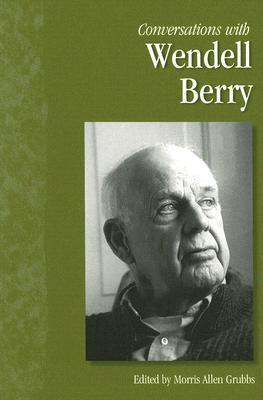
Since 1960, Wendell Berry (b. 1934) has produced one of the most substantial and consistently thematic bodies of work of any modern American writer. In more than fifty books in various genres-novels, short stories, poems, and essays-he has celebrated a life lived in close communion with neighbors and the earth and has addressed many of our most urgent cultural maladies. His collections of essays urge us to think and act responsibly as members of a community-both human and natural. Volumes of his poems seek to wed us to nature and realign our vision with its mysteries.
Conversations with Wendell Berry gathers for the first time interviews with the writer, ranging from 1973 to 2006, including one never before published. For readers acquainted with Berry’s work, this volume offers insights available nowhere else. It reveals succinctly the main currents of his life’s work. What emerges is a citizen-writer profoundly affected by cultural crises at home and in the world. — Book promo @ goodreads.com
A few quotes:
The government, for instance, thinks that national defense is making weapons, and the people go along and pay for it. But soil conservation is elementary national defense. So is people conservation. So is the conservation of culture and intelligence. So is the conservation of political liberty and of the economic independence of households and communities. If the nation is to be defended, it may need fewer warheads and many more real shareholdrs, people who own homes, homesteads, small businesses, small farms.
Q: What about the chances of some kind of grass-roots leadership organized from below?
Berry: That’s where the hope is now. I don’t see very much chance of the cities producing a grass-roots movement that can directly cause change. The cities may finally exert a grass-roots demand that can cause change, but the cities are helpless. The capacity of people in the cities to do things for themselves directly is extremely limited. They can’t produce food; they can’t produce building materials; they can’t produce the materials needed for clothing; they’re so cut off from the natural sources of their livelihood and so cut off from fundamental skills, most of them, that they can’t directly do much of anything.
One of the hopes in agriculture, though, is that city people will demand a food supply that’s safer and of better quality that the one they have now.
Q: And are there some signs of that?
Berry: There are some signs of that happening. I hope it goes ahead and happens. What I’m looking toward is the possibility that the country people, who do still have some capacity to help themselves directly, will start doing so. I think what this means is simply the rebuilding of communities.
Q: In your novel Jayber Crow, Jayber tells us, “Now I have had most of the life I am going to have, and I can see where it has been… and I have this feeling, which never leaves me anymore, that I have been led.” Do you share that feeling with Jayber? Is this an experience you only have when you are older? Is there some assurance along the way when, like Jayber, you are “cut completely adrift” or “wandering in the dark woods of error?”